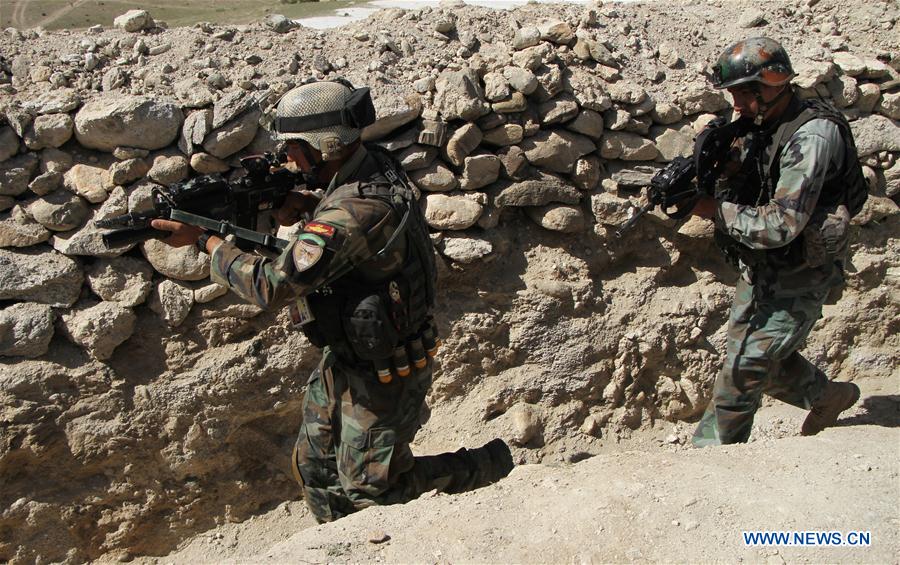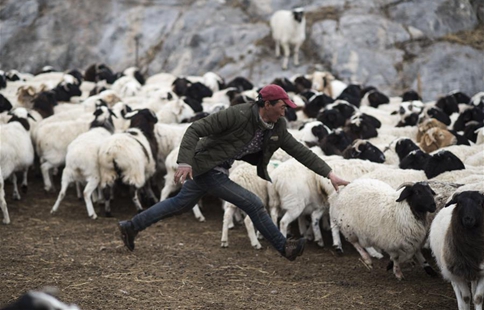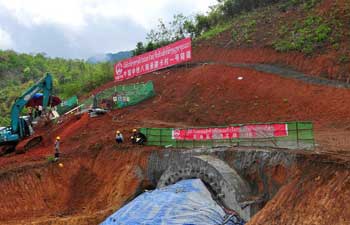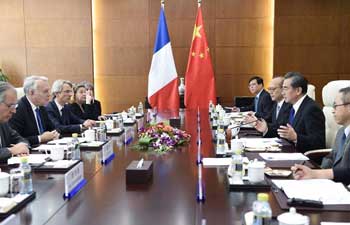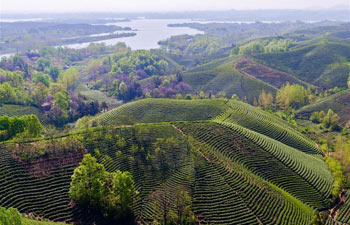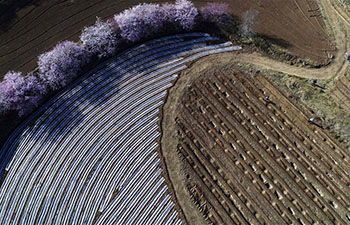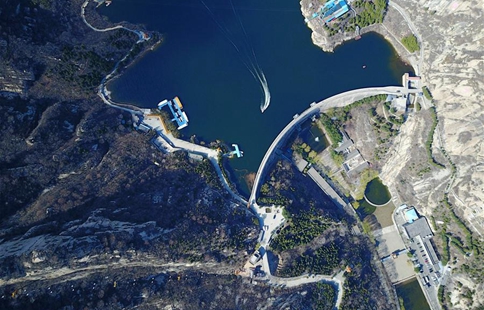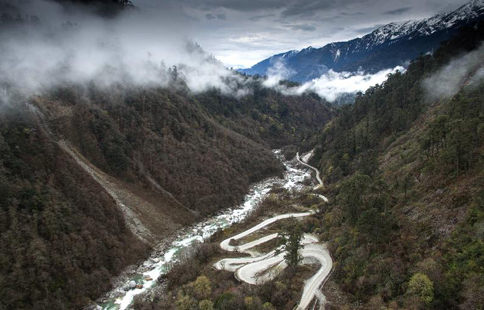Afghan army soldiers are deployed to Achin district of Nangarhar province, Afghanistan, after the U.S. military dropped a GBU-43 or Massive Ordnance Air Blast (MOAB) bomb on an IS cave complex in Achin district, on April 14, 2017. At least 82 militants of IS group had been killed following the raid that also destroyed a big IS hideout along with several bunkers as well as a 300-meter-long tunnels, according to Attaullah Khogyani, spokesman of the provincial government. (Xinhua/Rahman Safi)
KABUL, April 14 (Xinhua) -- Despite continued military operations by Afghan security forces backed by NATO-led coalition troops to drive out Islamic State (IS) militants from isolated areas of eastern province of Nangarhar, the IS fighters remained a big threat there.
On Thursday evening, the U.S. military dropped a GBU-43 or Massive Ordnance Air Blast (MOAB) bomb, the largest non-nuclear bomb, on an IS cave complex in Achin district, Nangahar Province, bordering Pakistan.
At least 82 militants of IS group had been killed following the raid that also destroyed a big IS hideout along with several bunkers as well as a 300-meter-long tunnels, according to Attaullah Khogyani, spokesman of the provincial government.
He said on his twitter account that the number of casualties on IS fighters may further go up as the assessment of the aftermath of the attack was going on in the mountainous region.
Earlier on Friday, the Afghan Defense Ministry, based on initial findings, said that 36 IS militants were killed.
"A senior IS commander named Seddiqyar was among the killed. This strike has a clear message for terrorists that they will be targeted anywhere and they cannot use Afghanistan as a safe place to launch terrorist attacks," the Afghan Media and Information Center said in a statement.
The strike, which occurred in Mohmand Dara village, Asadkhil area of the district, was aiming to help movement of joint security forces to eliminate IS from Nangarhar province, it said, adding that now, the security forces can easily enter the area to clear it from IS militants.
The strike also draws mixed reactions from various sides. Afghan President Mohammad Ashraf Ghani has hailed the attack, saying the move was part of efforts to defeat the IS group in Nangarhar and around the country at large.
However, Omar Zakhilwal, Afghan president special envoy and Afghan ambassador to Pakistan opposed the bombing.
"I find the use of the largest non-nuclear bomb, the so called 'mother of all bombs', on our soil reprehensible and counterproductive. If big bombs were the solution we would be the most secure place on earth today," Zakhilwal tweeted.
Afghan former President Hamid Karzai has also opposed the strike, saying "I vehemently and in strongest words condemn the dropping of the latest weapon, the largest non-nuclear bomb, on Afghanistan by U.S. military.
"This is not the war on terror but the inhuman and most brutal misuse of our country as testing ground for new and dangerous weapons. It is upon us, Afghans, to stop the U.S.," Karzai said on his twitter account.
Meanwhile, the strike did not cause any civilian casualties despite raising concerns by some Afghan officials that the air raid could resulted in the deaths of potential prisoners in the targeted complex.
"We have Afghan and U.S. Forces at the site and we see no evidence of civilian casualties nor have there been reports," Gen. John Nicholson, the U.S. and NATO commander in Afghanistan, told a press briefing here Friday afternoon.
"This was the right weapon against the right target," he said, adding that "I want to assure the people of Afghanistan that our forces took every possible precaution to prevent civilian casualties."
Anisa Kargar, a resident of northern Afghan province of Baghlan, told Xinhua by phone that the foreign forces' commander was right that the big bomb was a right weapon on a right target. "But in my opinion it did not take place in right time."
"The Thursday's bombing by U.S. forces would give more pretexts to the hand of insurgents and terrorist groups. It will help them to recruits more fighters," she added.
"The U.S. and other allied countries must help strengthen Afghan security forces instead of using modern weapons. Now, the Taliban are about to capture the city of Pul-e-Khumiri, Baghlan's provincial capital. The city is encircled by the Taliban militants but U.S. and NATO could not use - the mother of all bombs - to target them," she added.
Naqibullah, a resident of Nangarhar, told Xinhua via phone that the U.S. strike on the IS in Achin was a big blow to the terrorist group but the strike would not have a positive impact on the IS group.
"Over the past couple of years, security forces have killed hundreds of the IS fighters, but they are like insects, they never become weak or eliminated in the region," he said.
The province, with Jalalabad city as its capital, 120 km east of Kabul, has been the scene of clashes between security forces and IS militants since the emergence of IS there in early 2015.
More than 1,900 IS militants, several Afghan security forces and two U.S. soldiers have been killed in Achin and neighboring districts since 2015, according to Afghan military officials.
A U.S. Special Forces member was killed in Achin over the weekend.




